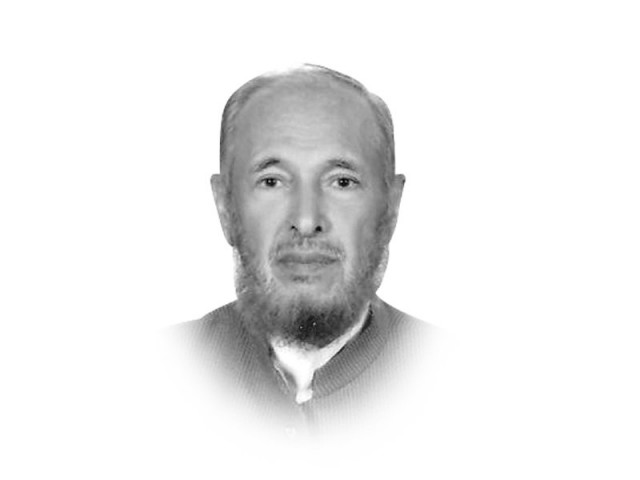Palestine in 2019
The biggest beneficiary of the prevailing chaos in the Middle East is the state of Israel

The writer is a former ambassador and former interior secretary
Internal divisions, lack of existence of any durable institutions, and competition for hegemony with Iran have come in the way of formulating a robust stance against Israeli expansionism.
Both intra-Arab and Arab-Iranian disputes or tensions have been orchestrated by external engineering in order to achieve the twin objectives of huge Western arms sales to Arab countries and to enable the state of Israel to continue its march to progress and prosperity while annexing more Arab lands for making new settlements.
In any peace negotiations, Israel would speak from a position of strength. As long as the Arab Middle East is in disarray, the Zionist state will not make any concession nor cede any territory. It would not renounce its claim to continue its settlements programme in order to restrict the size and capacity of any future Palestinian state.
The Palestinian cause for statehood has suffered because neither the regional Arab countries nor the big powers and the UN were able to put a genuine political and economic pressure on Israel to show flexibility and allow the two-state solution to become a reality.
What to speak of moving towards some reconciliation that could pave the way for a two-state solution, the situation is indeed deteriorating.
Israel has carried out air strikes on Syria since 2013 taking advantage of the pervasive state of insecurity. Arms convoys, government and Hezbollah installations and individuals who pose a threat have been targeted — with impunity.
In a recent statement, Avigdor Lieberman — who announced his resignation as Israel’s defence minister in November 2018 — has asserted that his country is in a position to fight on both the northern and southern sectors. In other words, while Israel can engage the Syrian and Hezbollah fighters in the north, it can also deal with Hamas in the southern Gaza Strip.
If Israeli-Syrian confrontation continues to result in a conflict, Hezbollah would almost certainly join the Syrian security forces, causing a war that would damage and destroy whatever infrastructure remains in the beleaguered country.
The biggest beneficiary of the prevailing chaos in the Middle East is the state of Israel. As a matter of fact, the war on Iraq was launched to destroy the biggest standing army in the Middle East, one that could pose a potential threat to the state of Israel. The ploy of the weapons of mass destruction — non-existent as they were — was used to create a façade for justifying one of the most criminal assaults on the independence of a sovereign country. Iraq would never be the same again.
With Arab Middle East in such dire straits, who would be interested either in pursuing the two-state solution or in the return of refugees to their homes?
Thus while the impasse on the political front continues, those displaced from their homes in 1948 and 1967 have continued to live as refugees, mostly in deplorable conditions and dependent on aid or charity.
Currently there are 7.4 million Palestinian refugees in the world. About one out of every three refugees in the world is a Palestinian. These include the descendants of those dispossessed of their homes in 1948 and 1967. In addition there are 1.8 million Palestinians living in the state of Israel.
Those refugees living in the state of Israel are treated as second-rate citizens who cannot cast votes in any election nor are they entitled to buy properties.
The Gaza Strip, home to two million refugees, is a vast prison, and rightly regarded as the biggest open-air prison in the world. About three million refugees live in the West Bank.
All access to the outside world from Gaza is controlled by Israel. Food and water supply lines are choked whenever authorities in Tel Aviv decide to inflict punishment on the impoverished residents.
For those refugees living in Jordan, Syria and Lebanon, life is not easy. They are not dependent on any assistance. Living under hard conditions for decades has made them tough, but the continued lack of opportunities for education, training, jobs, access to healthcare has taken a toll.
What would be a greater proof of the impotence of world organisations that are committed to enforcing their decisions and acting in pursuit of ending victimisation, discrimination, and restoring the rights of people displaced by illegal occupations?
Major Islamic countries share the blame for their inability or unwillingness to call a spade a spade.
The state of Israel that was created at the stroke of midnight on May 14, 1948 continued to flourish as disharmony amongst its Arab neighbours deepened over time. And the superpower that recognised the new state within eleven minutes of David Ben Gurion’s (Israel’s first Prime Minister) declaration of independence after 70 years of total support has finally shifted its embassy to Jerusalem.
The Arabs are paying a price for their disunity, and their inability to create robust institutions which could put them on track to develop human and material resources ensuring sustainable progress and stability. Only internally-strong governments enjoying support of the people could have mounted pressure on the US to change its policy. A policy that revolves around extending unqualified support to the state of Israel regardless of its continued defiance of the whole international community and its continued annexation of more and more Palestinian territory for its ever-expanding programme of settlements.
Published in The Express Tribune, January 22nd, 2019.
Like Opinion & Editorial on Facebook, follow @ETOpEd on Twitter to receive all updates on all our daily pieces.















COMMENTS
Comments are moderated and generally will be posted if they are on-topic and not abusive.
For more information, please see our Comments FAQ